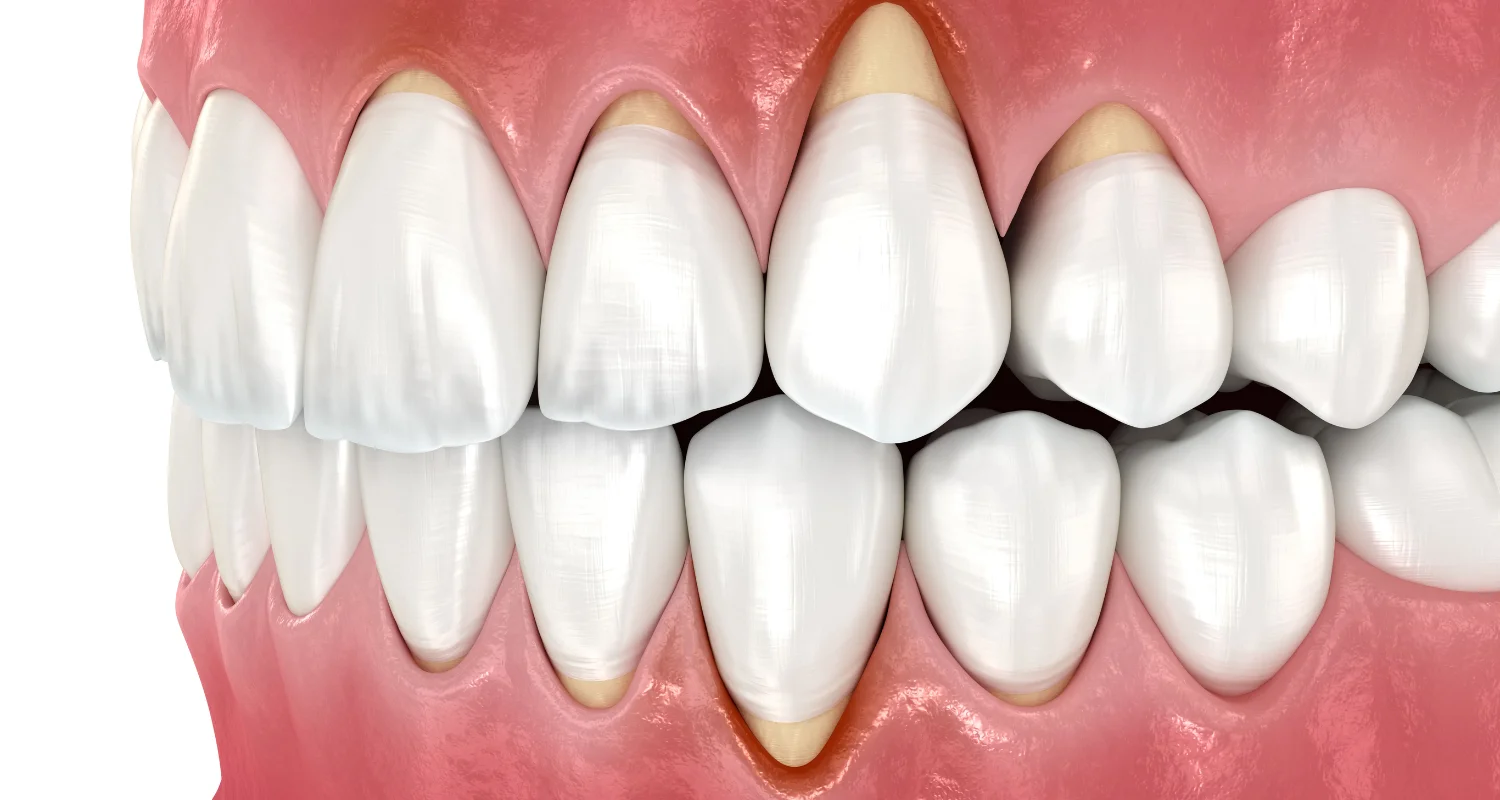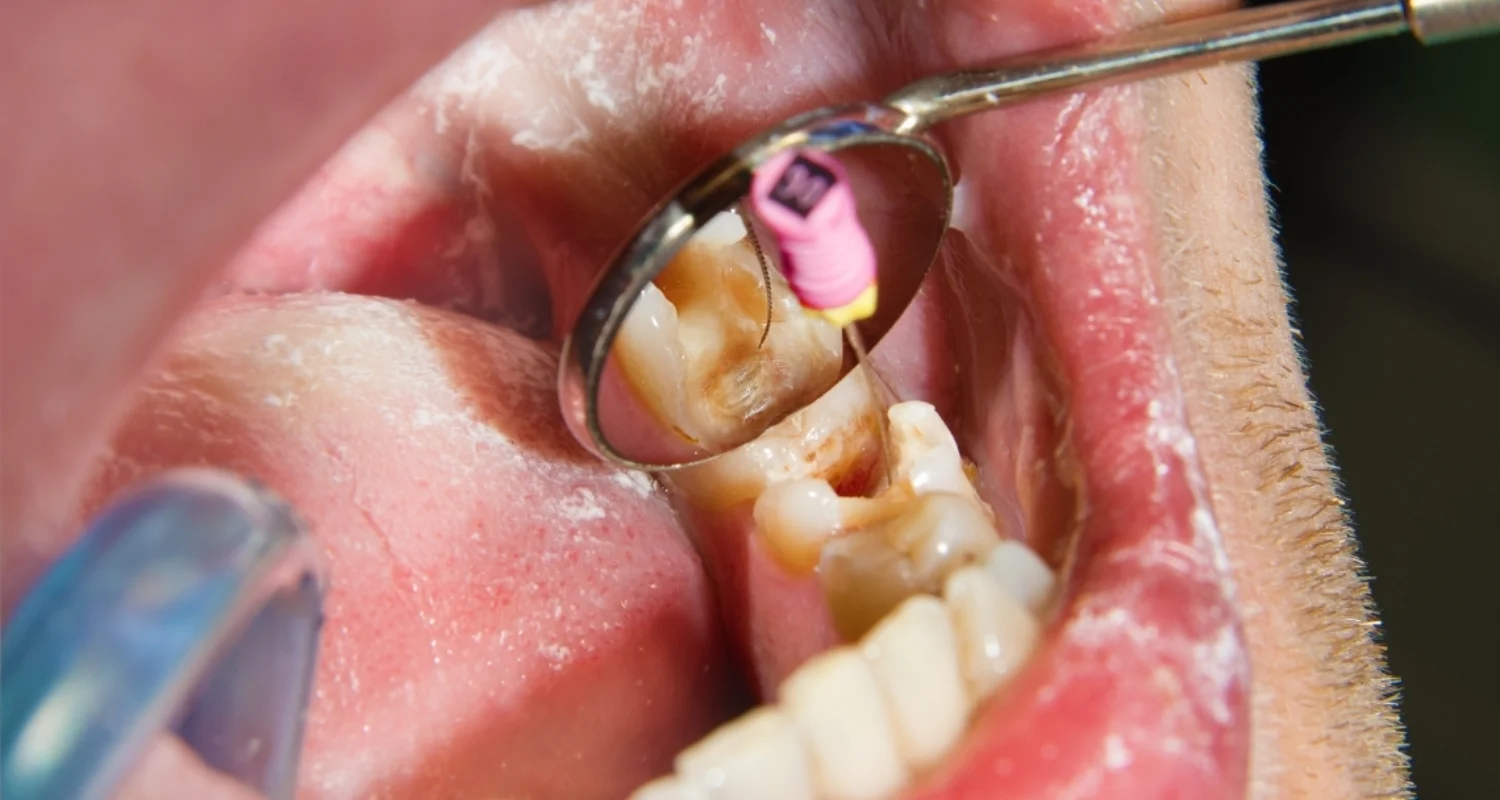Last Updated on: 16th December 2025, 11:07 am
You can relieve tooth nerve pain at home using saltwater rinses, clove oil, cold compresses, and over-the-counter painkillers like ibuprofen. Desensitizing toothpaste and dental wax can also help reduce discomfort. These methods offer temporary relief, but it’s important to visit a dentist to treat the underlying cause and prevent further damage.
We’ve all been there: suddenly hit with that sharp, unbearable tooth pain that stops you in your tracks. Tooth nerve pain isn’t just a little discomfort; it’s the kind of ache that can make eating, talking, or even thinking feel impossible. If you’ve experienced it, you know how quickly you want it gone!
The good news? You don’t always need to rush to the dentist for relief. While it’s important to see a dentist to address the root cause of the pain, there are plenty of things you can do at home to temporarily ease the discomfort until you can get professional help. We’ll walk you through the common causes, how to spot the symptoms, quick home remedies to ease the pain, and tips to keep it from coming back. Let’s dive in and get you back to feeling your best!
What is tooth nerve pain?
Inside each tooth lies a soft and vital part called the dental pulp, commonly known as the tooth nerve. This small but crucial structure houses nerves and blood vessels and is protected by two layers of hard tissue: the enamel, which forms the outermost layer, and the dentin, located just beneath it. Despite being tucked away, the dental nerve plays a significant role in the health of your teeth. It’s not just about sensitivity—it also acts as a natural warning system, alerting you when something isn’t right.
Tooth nerve pain occurs when the dental pulp becomes irritated or inflamed. This can happen due to factors like tooth decay, enamel wear, or a crack in the tooth. While the pain can be frustrating, it’s your body’s way of telling you to pay attention and seek care.
This type of pain can range from a dull ache to a sharp, shooting sensation and may persist or throb over time. Triggers like hot or cold foods, sugary treats, or even gentle pressure can set it off, making it hard to ignore. Because the nerve is highly sensitive and directly connected to the brain, the pain often feels amplified, which is why tooth nerve pain can be particularly intense and disruptive.
What Are the Causes of Tooth Nerve Pain?
Tooth nerve pain can arise from several underlying issues, all of which affect the sensitive dental pulp. Understanding these causes can help you pinpoint why you’re experiencing discomfort and guide you toward effective solutions. Let’s break down the most common culprits:
- Tooth decay or cavities: Cavities, or tooth decay, are like small holes that form in the teeth and can lead to big problems if not treated promptly. When decay penetrates through the enamel and dentin layers, it exposes the nerve inside the dental pulp. This exposure can result in heightened sensitivity and sharp pain, particularly when eating or drinking something hot, cold, or sweet. If left untreated, the pain may worsen as the decay progresses deeper into the tooth.
- Dental trauma: A strong impact, like a basketball hit, a bike fall, or any hard blow, can damage a tooth and the tissues around it. This kind of trauma often causes inflammation in the dental pulp, leading to throbbing pain. Even minor cracks or chips can allow bacteria or external elements to irritate the nerve, resulting in discomfort. In severe cases, the trauma may affect not only the tooth but also the surrounding bone, a condition known as dentoalveolar trauma, which can make the pain more persistent and challenging to manage.
- Gum recession and sensitivity: Gum recession happens when the gums that normally protect the roots of your teeth pull back, leaving the roots exposed. Unlike the enamel-covered part of the tooth, the roots are not built to handle direct exposure to external elements. This can lead to dental hypersensitivity, making your teeth react strongly to temperature changes, pressure, or even air. Gum recession is a common issue, affecting around 10% to 30% of people worldwide, and it often results from factors like aging, gum disease, or improper brushing habits.
- Bruxism (teeth grinding): Grinding or clenching your teeth, often caused by stress or sleep disorders, places excessive pressure on the teeth. Over time, this pressure can wear down enamel, crack teeth, or cause inflammation in the dental pulp, leading to nerve pain. Many people who grind their teeth may not even realize the damage until they begin experiencing sensitivity or discomfort.
- Dental procedures: Tooth nerve pain can sometimes occur after recent dental procedures like fillings, crowns, deep cleanings, or whitening treatments. This happens because the dental nerve may become temporarily irritated by the tools or materials used during the treatment. While this type of sensitivity is usually mild and goes away on its own after a few days, it’s important to pay attention to how long it lasts. If the pain continues or becomes more intense, it could indicate an issue such as an infection or a poorly fitted dental restoration, and you should reach out to your dentist for further evaluation.
By identifying the cause of your tooth nerve pain, you can take appropriate steps to address it and prevent further discomfort. Always consult with a dentist to ensure proper diagnosis and treatment.
What Are the Symptoms of Tooth Nerve Pain?
Tooth nerve pain can present in various ways, and recognizing the symptoms is key to addressing the issue effectively. Here are the most common signs to look out for:
- Sharp, shooting pain: A sudden, intense pain is often triggered by specific stimuli, such as hot or cold beverages, sweet foods, or even breathing in cold air. It tends to come and go quickly but can be highly disruptive.
- Persistent throbbing: Unlike shooting pain, this type of discomfort lingers and may worsen over time. It can feel like a constant, pulsating ache that doesn’t let up, even when at rest.
- Sensitivity to pressure: If you feel discomfort or pain when biting, chewing, or applying any pressure to a tooth, it could indicate nerve irritation or damage.
- Radiating pain: Tooth nerve pain can sometimes spread beyond the affected tooth, causing discomfort in nearby areas such as the jaw, ear, or even the head. This radiating pain can make it harder to pinpoint the exact source of the problem.
Recognizing these symptoms early can help you take the right steps to manage the pain and seek appropriate care if needed.
What Are the Best Ways to Easily Relieve Tooth Nerve Pain?
Tooth nerve pain can feel unbearable, but several remedies can provide quick relief until you can see a dentist. Here are some of the best options, including home remedies and over-the-counter solutions, along with simple instructions for using them effectively.
Quick home remedies
- Saltwater rinse
Saltwater helps cleanse the affected area, reducing inflammation and flushing out bacteria.
How to use: Mix 1 teaspoon of salt into a glass of warm water, swish it around your mouth for 30 seconds, and spit it out. Repeat as needed.
- Clove oil
Clove oil contains eugenol, a natural anesthetic that helps numb pain temporarily.
How to use: Apply a small amount of clove oil to a cotton ball and gently press it against the painful tooth for a few minutes.
- Cold compress
A cold compress can numb the nerve and reduce swelling in the surrounding area.
How to use: Wrap ice or a cold pack in a cloth and hold it against your cheek near the painful tooth for 10-15 minutes. Repeat as necessary.
- Hydrogen peroxide rinse
Hydrogen peroxide helps clean and disinfect the mouth, offering temporary relief from nerve pain.
How to use: Mix equal parts of 3% hydrogen peroxide and water, swish it in your mouth for 30 seconds, and spit it out. Rinse with water afterward.
- Garlic paste
Garlic contains allicin, a natural antibiotic and pain reliever.
How to use: Crush a garlic clove to make a paste and apply it to the painful area for a few minutes. Rinse thoroughly afterward.
Over-the-counter options
- Painkillers (e.g., Ibuprofen)
Ibuprofen or other nonsteroidal anti-inflammatory drugs (NSAIDs), are great options for reducing both pain and inflammation caused by tooth nerve issues. For stronger relief, combining ibuprofen with acetaminophen (paracetamol) can be more effective. Always follow the dosage instructions on the package, and take the medication with food if needed to prevent stomach upset.
Note: If you’re taking other medications, have conditions like heart disease or high blood pressure, or are pregnant, it’s important to consult a doctor before using them.
- Desensitizing toothpaste
Desensitizing toothpaste is a helpful option for reducing tooth nerve pain and sensitivity. It works by sealing tiny tubules in your teeth, which minimizes nerve exposure and makes your teeth less reactive to triggers like hot, cold, or sweet foods.
To use it, brush your teeth with the toothpaste twice a day, focusing on the sensitive areas. For extra relief, you can also apply a small amount directly to the affected area with your finger and leave it on overnight to enhance its effectiveness.
- Dental wax
Dental wax is a simple and practical way to temporarily relieve tooth nerve pain. By covering cracks, cavities, or exposed dentin, it shields the nerve from external triggers like hot or cold foods, reducing sensitivity and discomfort. It’s a handy solution to use while you wait for a dental appointment.
To apply it, warm a small piece of dental wax between your fingers, then press it onto the affected area for immediate protection and relief.
These remedies can help manage tooth nerve pain at home, but remember they’re temporary solutions. It’s essential to visit a dentist to address the root cause and prevent further issues.
What Foods Should You Avoid If You Have Tooth Nerve Pain?
Certain foods and drinks can trigger or worsen tooth nerve pain, so it’s important to steer clear of them when experiencing sensitivity. Here’s a breakdown of what to avoid:
- Very cold or hot foods and drinks: Extreme temperatures can easily irritate an already sensitive tooth nerve. Avoid foods like ice cream, cold beverages, or hot drinks like coffee and tea to prevent sudden sharp pain.
- Sugary foods and sweets: Sugary treats like candies, chocolate, and sodas feed the bacteria in your mouth, increasing the risk of further tooth decay and sensitivity. Cutting down on sugar can help protect your teeth from worsening pain.
- Acidic foods: Acidic items, such as citrus fruits, vinegar, and tomatoes, can erode tooth enamel, exposing the nerve and heightening sensitivity. These should be avoided to reduce irritation.
- Hard or crunchy foods: Chewing on hard foods like nuts, toasted bread, or hard candies can put pressure on a sensitive tooth, potentially worsening pain or causing further damage, especially if there’s a crack or cavity.
- Spicy foods: Spicy foods can act as irritants, making nerve sensitivity worse and causing discomfort in the surrounding gums or soft tissues.
By avoiding these types of foods and drinks, you can help minimize discomfort and protect your teeth until you’re able to address the root cause of the pain.
What to do if the tooth nerve pain doesn’t disappear?
If your tooth nerve pain doesn’t go away, it could mean there’s a more serious problem that needs professional care. Home remedies and over-the-counter solutions can only provide temporary relief, but persistent or worsening pain is a sign it’s time to visit the dentist. Pay close attention to symptoms like fever, swelling, or pus, as these could indicate an abscess or infection that requires urgent attention.
Don’t wait too long, ignoring tooth nerve pain can lead to more serious complications or infections that could spread to other parts of your body.
Risks of ignoring tooth nerve pain
Tooth nerve pain is your body’s way of signaling that something is wrong with your tooth. If you don’t take care of it in time, the problem can become worse and lead to serious complications. Here’s what can happen if you ignore it:
- Dental infection: Bacteria can reach the nerve and surrounding tissues, causing a serious infection. In severe cases, this might even require a hospital visit to treat.
- Spread of infection: Without treatment, the infection can spread to other parts of your body, affecting your overall health and potentially becoming dangerous.
- Impact on nearby teeth: An untreated dental issue doesn’t just affect the initial tooth; it can spread to nearby teeth, causing further problems.
- Weakened and broken tooth: Decay can make your tooth weaker, and if left untreated, it can lead to cracks or fractures.
- Tooth loss: If the problem is left unchecked, the damage may become irreversible, leaving tooth extraction as the only option.
Taking action early can protect your teeth, your health, and your smile.
Dental treatments available
Tooth nerve pain can be really uncomfortable, but there are several treatments available depending on the cause. Here’s a simple explanation of the most common options your dentist might recommend:
1. Dental fillings: If the nerve pain is mild, a filling might be enough to fix the issue. The dentist removes the decayed part of the tooth and fills it with a material that protects the nerve and restores the tooth’s shape and function. This stops the pain and prevents further damage.
2. Direct pulp capping: When the nerve is exposed due to a deep cavity or a crack, a special material is placed directly on the nerve to reduce inflammation and pain. This helps the nerve heal and prepares the tooth for a filling later. It’s most effective for younger patients or cases with less severe damage.
3. Root canal: If the nerve is too damaged to heal, a root canal might be needed. The dentist removes the damaged nerve, cleans and disinfects the inside of the tooth, and seals it with a special material. While the tooth will no longer have a nerve, it can still function for chewing, though it may be more fragile.
4. Tooth extraction: If the damage is too severe to save the tooth, extraction is the best option. The dentist removes the tooth, but there are ways to replace it, such as implants or bridges, to restore both your smile and chewing ability.
Your dentist will help you choose the best treatment for your situation, aiming to relieve your pain and protect your dental health. Don’t hesitate to ask questions and make the decision that feels right for you.
Why Is Good Oral Health Important for Preventing Tooth Nerve Pain?
Taking care of your oral health is key to preventing tooth pain and maintaining a healthy smile. Here are some simple tips to keep your mouth pain-free:
- Daily oral hygiene: Brush your teeth at least three times a day with a soft-bristled toothbrush and fluoride toothpaste. Use dental floss to remove food particles and bacteria between your teeth, and finish with a fluoride mouthwash for extra protection.
- Regular dental checkups: Visit your dentist every six months for professional cleanings and checkups. These visits help catch problems early, preventing unnecessary pain and complications.
- Healthy diet and lifestyle: Eat a balanced diet rich in fruits, vegetables, and dairy to strengthen your teeth. Avoid excessive sugar, alcohol, and tobacco that can harm your oral health, and drink plenty of water to stay hydrated.
Conclusion
Tooth nerve pain can be an uncomfortable and disruptive experience, but understanding its causes and knowing how to manage it can make all the difference. Issues like cavities, dental trauma, or gum recession are common culprits; while home remedies or pain relievers may provide temporary relief, they’re not a long-term solution. Acting quickly and seeking professional care if symptoms persist or worsen is essential to prevent further complications.
Preventive care is the best way to avoid tooth nerve pain altogether. By practicing good oral hygiene, maintaining a balanced diet, and visiting your dentist regularly, you can protect your teeth and ensure a healthier smile. Don’t let tooth pain go untreated, your oral health is worth the care and attention it deserves.
Frequently Asked Questions
Is tooth nerve pain reversible?
It depends on the cause. Early-stage issues like mild sensitivity or minor cavities can often be treated successfully. However, severe nerve damage or infection may require more advanced treatments like root canals or extractions.
How can I relieve tooth nerve pain during pregnancy?
If you’re pregnant, it’s important to be cautious with medications. Acetaminophen (paracetamol) is considered one of the safest pain relievers, but always consult your doctor before taking it. Keep in mind that pain relievers only provide temporary relief, and the underlying cause requires professional treatment. Treating infections promptly is crucial to protect both the mother and the baby.
Is tooth nerve pain a dental emergency?
It can be, especially if it’s accompanied by swelling, fever, pus, or persistent, severe pain. These signs may indicate an infection or abscess, requiring immediate dental attention.
Why does tooth nerve pain get worse at night?
When lying down, increased blood flow to your head can amplify the sensation of pain. Additionally, there are fewer distractions at night, making the discomfort feel more noticeable.
What should I do if my child complains of tooth nerve pain?
If your child complains of tooth nerve pain, it’s important to address it promptly. You can use pain relievers like acetaminophen (paracetamol) or ibuprofen, following the recommended dosage for their age, to provide temporary relief. However, because dental issues like cavities and infections progress quickly in children, it’s essential to take them to a dentist as soon as possible. Prompt professional care can prevent the problem from worsening and protect your child’s oral health.
Voice and Search (Q&A)
What is the fastest way to numb tooth nerve pain at home?
Applying clove oil or a cold compress near the affected area can numb the tooth nerve quickly. You can also rinse with warm salt water or use over-the-counter painkillers for fast, temporary relief.
Can I use hydrogen peroxide to help with tooth nerve pain?
Yes, a diluted hydrogen peroxide rinse can help reduce bacteria and inflammation around the painful tooth. Mix equal parts of 3% hydrogen peroxide and water, swish for 30 seconds, and rinse with water afterward.
When should I see a dentist for tooth nerve pain?
See a dentist if the pain lasts more than a couple of days, gets worse, or comes with swelling, fever, or pus. These symptoms may indicate infection or nerve damage that needs professional treatment.
Share
References
1. Bender, I. B. (2000, march). Pulpal pain diagnosis – A review. Journal of endodontics. Volume 26, issue 3, pages 175-179. https://doi.org/10.1097/00004770-200003000-00012
2. Cronkleton, E. (2023, 13 September). 11 Home and Natural Remedies for Toothache Pain. Healthline. https://www.healthline.com/health/dental-and-oral-health/home-remedies-for-toothache
3. Fukuda, K. (2016, March 31). Diagnosis and treatment of abnormal dental pain. Journal Of Dental Anesthesia And Pain Medicine, 16(1), 1. https://doi.org/10.17245/jdapm.2016.16.1.1
4. Renton, T., & Wilson, N. H. (2016). Understanding and managing dental and orofacial pain in general practice. British Journal Of General Practice, 66(646), 236-237. https://doi.org/10.3399/bjgp16x684901
5. Seed, S. (2024, 24 march). Toothache Relief and Home Remedies. WebMD. https://www.webmd.com/oral-health/home-remedies-toothache
6. Tanenbaum, D. R. (2024, 2 july). Trigeminal Neuralgia and the Experience of Tooth Pain. American Association Of Endodontists. https://www.aae.org/specialty/trigeminal-neuralgia-and-the-experience-of-tooth-pain/
-
Nayibe Cubillos M. [Medical Reviewer]
Pharmaceutical Chemestry |Pharmaceutical Process Management | Pharmaceutical Care | Pharmaceutical Services Audit | Pharmaceutical Services Process Consulting | Content Project Manager | SEO Knowledge | Content Writer | Leadership | Scrum Master
View all posts
A healthcare writer with a solid background in pharmaceutical chemistry and a thorough understanding of Colombian regulatory processes and comprehensive sector management, she has significant experience coordinating and leading multidisciplina...






















